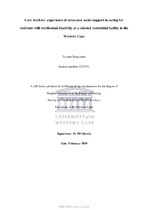Care workers’ experience of stress and social support in caring for residents with intellectual disability at a selected residential facility in the Western Cape
Abstract
Caring for people with intellectual disability is stressful as they have a reduced ability to cope
independently. The stress may be exacerbated by the challenging behaviours intellectually
disabled people display and by the lack of social support that care workers may experience.
The aim of this study is to explore and describe care workers’ experience of stress and social
support whilst caring for intellectually disabled residents with challenging behaviour.
A qualitative, exploratory, descriptive phenomenology study was utilised to answer the
research question: “What are the experiences of stress and social support of care workers caring
for intellectually disabled residents with challenging behaviour at a residential facility in the
Western Cape?” A purposive sampling technique was utilised to select ten care workers
working at a residential facility for intellectually disabled residents with challenging behaviour
in the Western Cape. Lazarus and Folkman’s transactional model of stress and coping has been
used to guide the study. Data were collected by means of semi-structured interviews. Colaizzi’s
method of data analysis was used to analyse the data.
The four main themes that emerged are: (1) acceptance of abuse as a working condition, (2)
interpersonal relationships with colleagues, residents and residents’ families, (3) the selfimpacted
by an array of emotions and (4) social support and coping strategies used to deal with
the stress experienced. The study concluded that care workers’ training does not prepare them
to understand and manage residents with challenging behaviour adequately. Formalised
training as well as interpersonal skills building is necessary for them to cope with the stress
they experience while working with intellectually disabled residents.

